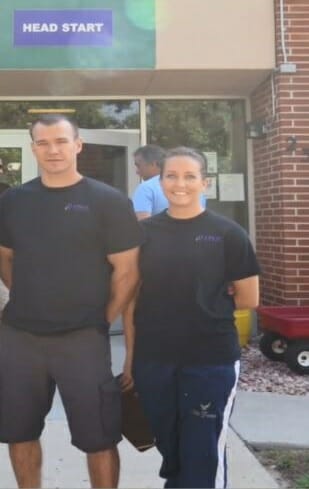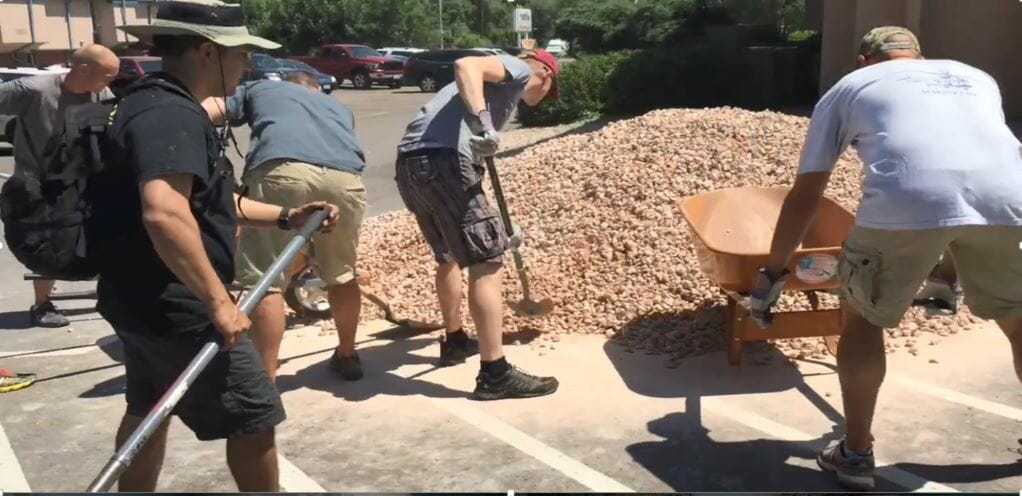Military Educator Living “Whole Airman Concept” by Helping Children from Low-Income Families


Technical Sgt. Airica Harms-Colby is a professional military educator at the Peterson Air Force Base by day, but her volunteerism with the Colorado Springs, Colorado chapter of Head Start (CPCD) is one that she says is a personal passion and natural extension of humanitarianism promoted by the U.S. Air Force. According to Head Start, nearly 11,000 children under the age of 6 are living in poverty in Colorado Springs and the surrounding area. These children face higher rates of committing crimes, dropping out of school, becoming teen parents and depending upon public assistance. Through Head Start, early childhood education combined with family support is provided to ensure brighter futures for these children — an initiative that is personal for Airica, who grew up in a low-income home. Wanting to give back to her community beyond the base she calls home, Airica is making a difference by serving as a leader for her military family and making an impact on those most in need in the community, and is today’s Daily Point of Light Award honoree. Points of Light spoke to her to learn more about her work with CPCD.
How did you decide to support Head Start?
When I was stationed in Texas, I was heavily involved in the community. We move frequently, and when I moved to Colorado, I was trying to figure out how to get involved. We try to give our students as many opportunities to volunteer across the military bases as we can. My (Air Force class) was so on board with the idea of volunteering with CPCD, they suggested we get the whole class of airmen involved, and we sure the heck did. Between staff and class, we have 120 people, and we refreshed both buildings, did landscaping. It was a pretty big venture, but that’s how we first built the relationship.
This is a personal cause for you. Explain.
My husband and I both came from very low-income families. Our parents did the best they could, my mom taught for Head Start. These organizations do so much for families that really just don’t have a lot. I would have actually never known that I came from a low-income family, I didn’t realize until I was an adult, because these organizations are just so rich, they provide everything for families that really just don’t have a whole lot.

You’re not just an individual contributor. How did you get so many others to help?
This is a personal passion, but community relations is also part of something the Air Force breeds. It is paramount for us to be a whole airman – it’s called the “Whole Airman Concept.” It’s something that our leadership really drives home, from the top, down. This is something we do to build relationships through the communities we live in. We want to make sure that there is a relationship with the community outside of the bases we live and work at, and that they understand we have a mission. We take care of the people within our walls, but we also want to make sure we are taking care of people outside of the base. It’s about taking care of people, it’s about humanitarianism, it’s about community.
You’ve been called a “champion” for the Head Start families and an example of “true military leadership.” What does it mean to you, to hear that?
Wow (laughing). A champion for Head Start…I mean…it’s very humbling. You tell me to do it, and I will make it happen. It’s just the challenge of these grand projects – I had support from the whole team of people from Head Start and my school the whole time, and it definitely wasn’t just me. Everybody came together to make this happen, we just had a fantastic attitude from everybody, including leadership. This is something that the Air Force has instilled and taught, so I’m fulfilling something that I believe in, absolutely.
Why is it so important to give back to the community?
I’m not going to stay here (in Colorado Springs), I leave in February, and it’s important that the relationship that I leave behind is great for the people that I leave here. It’s great for my institution, if you consider those second and third order effects of what you do today. So, if I build relationships today, if I have a fantastic attitude today, then what kind of relationship can I build for my institution and my base tomorrow? When things get hard in the future, we can always go back and we can remember the awesome relationship that was built a few years ago. It’s always about ‘how can I leave things better?’
Where does your dedication to help others come from?
I definitely have to applaud my parents, they’re both servant leaders. My mom is a teacher, I remember her finishing her student teaching when I was in grade school, and then my father is a retired police officer, he’s now a farmer. So that servant leadership has always been instilled with me, we’ve always been involved with community, whether it was church, or school, or 4-H. And then after joining the Air Force, I’ve just always volunteered, it was always something that was a drive in my belly.
How would you encourage others to give back in their own communities?
It isn’t always about showing up for giant projects, sometimes it’s even about helping people carry their groceries out of the grocery store that just look like they are struggling, or, picking up something for someone who just dropped something at the gas station. Honest to gosh, it’s just about helping people who might be having a hard day, or smiling, or asking someone how they’re doing today, it really is, just about that. And then, when you do have time, volunteering at your soup kitchen, helping out with Meals on Wheels, and giving back as much as you can.
Do you want to make a difference in your community like Airica? Visit All For Good to find local volunteer opportunities.
